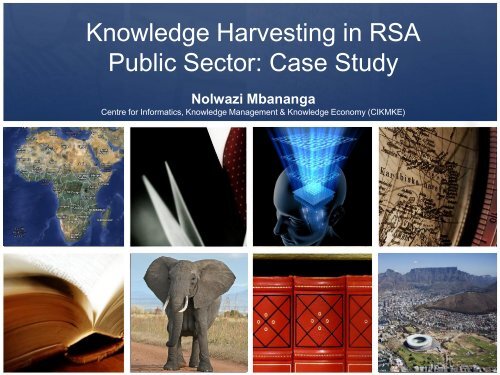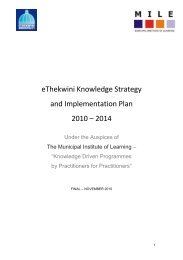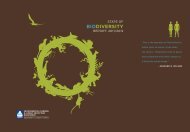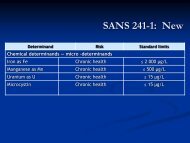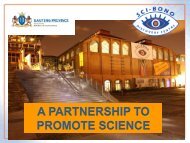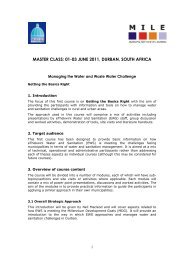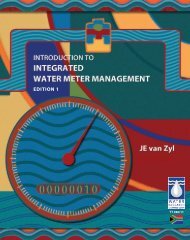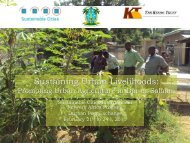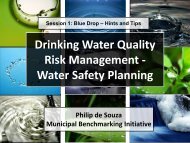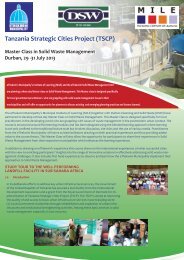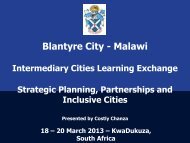Knowledge Harvesting in RSA Public Sector : Case Study - MILE
Knowledge Harvesting in RSA Public Sector : Case Study - MILE
Knowledge Harvesting in RSA Public Sector : Case Study - MILE
Create successful ePaper yourself
Turn your PDF publications into a flip-book with our unique Google optimized e-Paper software.
<strong>Knowledge</strong> <strong>Harvest<strong>in</strong>g</strong> <strong>in</strong> <strong>RSA</strong><br />
<strong>Public</strong> <strong>Sector</strong>: <strong>Case</strong> <strong>Study</strong><br />
Nolwazi Mbananga<br />
Centre for Informatics, <strong>Knowledge</strong> Management & <strong>Knowledge</strong> Economy (CIKMKE)
Background<br />
‣ There is a grow<strong>in</strong>g concern with<strong>in</strong> the South<br />
African Government<br />
‣ The knowledge and experienced gathered is lost<br />
‣ This loss is through resignations, retirements etc.<br />
‣ Lessons learned at all levels of government,<br />
<strong>in</strong>clud<strong>in</strong>g Parliament<br />
‣ The lessons learned are not captured and shared<br />
‣ Lead<strong>in</strong>g to re<strong>in</strong>vent<strong>in</strong>g the wheel and repeated<br />
mistakes<br />
‣ <strong>Study</strong> conducted by DPSA shows evidence of<br />
this loss
What is <strong>Knowledge</strong> <strong>Harvest<strong>in</strong>g</strong>?<br />
‣<strong>Knowledge</strong> <strong>Harvest<strong>in</strong>g</strong> is one of the<br />
techniques used to preserve <strong>in</strong>stitutional<br />
memory<br />
‣Is a new activity <strong>in</strong> the <strong>Public</strong> <strong>Sector</strong><br />
‣The SKHA Model is used<br />
‣This model has been used <strong>in</strong> comb<strong>in</strong>ation<br />
with multimedia, e.g. audio & video<br />
‣Eg: MRC and National Treasury (IDC)
<strong>Knowledge</strong> Cont<strong>in</strong>uity Programme<br />
‣ The MRC harvested the<br />
scientists’ knowledge to:-<br />
– Share scientific knowledge<br />
with univ. students<br />
– Share research knowledge<br />
with communities –<br />
Research Translation<br />
– To preserve scientists’<br />
knowledge as part of<br />
<strong>in</strong>stitutional memory<br />
‣ This process is critical <strong>in</strong><br />
the light of the ag<strong>in</strong>g<br />
scientific population<br />
‣ The IDC was plagued by<br />
staff turnover with<strong>in</strong> the<br />
ODAP<br />
‣ IDC Implemented KCM<br />
as part of KM to:-<br />
– Capture the tacit<br />
knowledge of staff<br />
members<br />
– share, grow knowledge<br />
base, <strong>in</strong>stitutional memory,<br />
knowledge transfer, job<br />
profile review
Processes for <strong>Knowledge</strong> <strong>Harvest<strong>in</strong>g</strong><br />
‣ <strong>Knowledge</strong> Structure Identification<br />
Process<br />
<strong>in</strong>volves a review of the current job<br />
conducted by a senior manager<br />
identifies the areas which have critical<br />
bear<strong>in</strong>g – <strong>Knowledge</strong> <strong>Harvest<strong>in</strong>g</strong><br />
‣Def<strong>in</strong>es scope for <strong>Knowledge</strong> <strong>Harvest<strong>in</strong>g</strong><br />
‣The scope determ<strong>in</strong>es the breath, depth<br />
and the technology to be used.
<strong>Knowledge</strong> Structure Development<br />
‣ <strong>Knowledge</strong> profile development assess job & know by:<br />
conduct<strong>in</strong>g <strong>in</strong>-depth <strong>in</strong>terviews with staff<br />
senior manager or the direct supervisor<br />
develop tool<br />
short questionnaire which identifies critical<br />
knowledge<br />
‣ The knowledge contributed us<strong>in</strong>g the tool – thematised<br />
‣ A knowledge <strong>Harvest<strong>in</strong>g</strong> Questionnaire is developed<br />
further by:-<br />
KM Specialist and Senior manager for reliability and validity
Conduct<strong>in</strong>g <strong>Knowledge</strong> <strong>Harvest<strong>in</strong>g</strong><br />
‣A schedule was developed for staff<br />
members. It consisted of:<br />
• the name of the staff member<br />
• the person to conduct the <strong>in</strong>terviews<br />
‣Questionnaires were distributed to the<br />
harvestees & Lab Technician (2 wks before)
Scientific Challenges<br />
‣Lessons stay <strong>in</strong> conscious, subconscious<br />
and unconscious m<strong>in</strong>d<br />
In-depth lesson is <strong>in</strong> the unconscious m<strong>in</strong>d<br />
‣The ability to harvest the unconscious<br />
knowledge<br />
This is the knowledge that embraces<br />
competencies<br />
‣The knowledge which cannot be explicitly<br />
expla<strong>in</strong>ed or transferred easily<br />
Even experts do not know that they have it,<br />
It is reflected <strong>in</strong> actions
Technology to Unconscious Learn<strong>in</strong>g<br />
‣Hypnosis could be the mechanism (Freudian<br />
theory)<br />
‣Specialised computer aided electrodes or<br />
bio-electronics<br />
‣Lack of high level precision <strong>in</strong> elicit<strong>in</strong>g<br />
required knowledge<br />
‣<strong>Knowledge</strong> harvest<strong>in</strong>g need to sharpen its:-<br />
mechanisms, techniques and methods to m<strong>in</strong>e<br />
this k<strong>in</strong>d of knowledge.<br />
‣Space for future research <strong>in</strong> KM
Implementation Challenges - Government<br />
‣ Lack of understand<strong>in</strong>g of the concept of KM;<br />
‣ Lack of understand<strong>in</strong>g of <strong>Knowledge</strong> <strong>Harvest<strong>in</strong>g</strong>;<br />
‣ Balance between knowledge shar<strong>in</strong>g and<br />
knowledge hoard<strong>in</strong>g;<br />
‣ Lack <strong>in</strong>centives, recognition and reward systems;<br />
‣ Lack of policies on knowledge harvest<strong>in</strong>g;<br />
‣ Confidentiality vs Shar<strong>in</strong>g of harvested<br />
knowledge;<br />
‣ Lack of tra<strong>in</strong>ed personnel to conduct knowledge<br />
harvest<strong>in</strong>g;<br />
‣ Lack of legal framework support<strong>in</strong>g knowledge<br />
harvest<strong>in</strong>g.
Conclusion<br />
‣ A need for more knowledge labs and more<br />
studies<br />
‣ Improve <strong>Knowledge</strong> <strong>Harvest<strong>in</strong>g</strong> tools, technology<br />
and mechanisms<br />
‣ Tra<strong>in</strong> more people to engage <strong>in</strong> <strong>Knowledge</strong><br />
<strong>Harvest<strong>in</strong>g</strong> of Institutional Memory<br />
‣ Adapt Conditions of Services for a conducive<br />
environment<br />
‣ Legal Framework that support <strong>Knowledge</strong><br />
<strong>Harvest<strong>in</strong>g</strong><br />
‣ Reward and Recognition System to promote K-H
Example of a <strong>Knowledge</strong> Lab <strong>in</strong> <strong>RSA</strong>
Example of a <strong>Knowledge</strong> Lab <strong>in</strong> <strong>RSA</strong>
Questions?<br />
Thank you | nolwazi@cikmke.co.za


